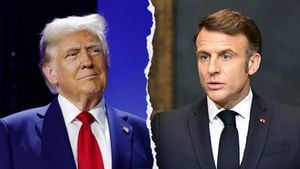On February 23, 2025, Kenia López Rabadán, the vice president of Mexico's Chamber of Deputies and member of the Party of National Action (PAN), presented a constitutional reform proposal aimed at changing the official name of the country from "Estados Unidos Mexicanos" to simply "México." This move has sparked discussions about national identity and cultural significance across Mexican society.
López Rabadán argued fervently for the proposed change, stating, "This name is the one which gives us identity and belonging." She explained how this amendment does not alter the country's federal structure or its form of government. Instead, it aims to fortify national identity, simplify official documentation, and align Mexico’s name with international standards used by organizations such as the United Nations and the Organization of American States.
The terminology "Estados Unidos Mexicanos" has been the official designation since 1824, enshrined through subsequent constitutions since 1857 and 1917. Yet, López pointed out the fact the country has been historically known by several other names, such as "República Mexicana" (1857), "Nación Mexicana" (1824), and "América Mexicana" (1814). Each of these terms reflects different facets of Mexico's complex history and identity.
“The name ‘México’ derives from the Nahuatl language, combining the words ‘Metztli’ meaning ‘moon’, ‘Xictli’ meaning ‘center’, and ‘Co’ meaning ‘place’. Therefore, it translates to ‘in the center of the moon,’” the deputy emphasized, elucidately connecting the proposed name change to the historical significance of Tenochtitlán, the ancient heart of the Aztec Empire.
Highlighting the disconnect between the formal name and common vernacular, López mentioned, “Families across the nation do not use the full name; they refer to us simply as ‘México.’” This observation echoed the widespread norm among citizens who identify more closely with the term 'México' than the lengthy official nomenclature.
Encouragingly, López noted, “Organizations like the UN and OAS already refer to our country as Mexico. It is time for our Constitution to reflect this.” This sentiment appears to resonate broadly; many supporters believe changing the name would eliminate unnecessary complexity and align the official stance of the government with general practices observed internationally.
The proposal also includes clarifications aimed at dispelling concerns about potential political ramifications. "This change would not mean abandoning our federal system or transforming our government structure," she stated, reiterative of the unchanged nature of Mexico’s political identity as stated under Article 40 of the Constitution, which defines it as a representative, democratic, secular, and federal republic comprised of free and sovereign states united within a Federation.
Though López’s initiative may seem radical to some, it brings to light a topic long discussed within Mexican politics. Previous attempts to modify the country’s name have been raised by figures from various political spectrums, particularly by former President Felipe Calderón, who brought the matter forward during both his presidency and as a federal deputy.
Addressing Mexico’s politically fragmented state, López asserted, "We propose unity amid division. Mexico is our name: let’s make it official!" Her call signals a desire to build cohesion through shared identity at a time when political parties seem increasingly divided.
Undoubtedly, this initiative reflects more than just semantics. It speaks to deep-seated values of cultural recognition and the desire to redefine Mexico’s national identity for citizens both at home and abroad. By embracing the term 'Mexico' as the official name, López and her supporters hope to reinforce this identity and create stronger ties between citizens and their homeland.
Looking forward, the proposal will require thorough examination and debate within the legislative chambers. Should it gain traction, the name change could be seen not only as renaming something long-established but as potentially ushering Mexico toward redefining its identity on both domestic and international stages.



